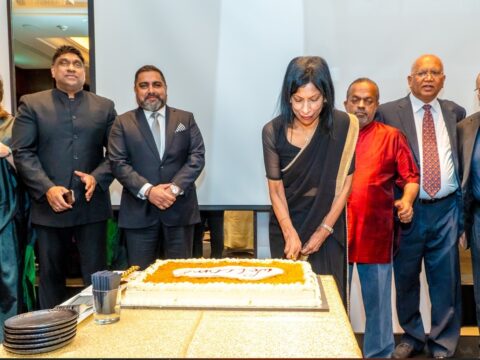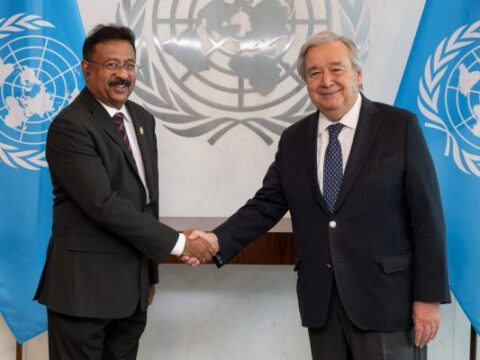COLOMBO: In a stunning political shift, Sri Lanka’s National People’s Power (NPP) coalition, led by President Anura Kumara Dissanayake, secured an overwhelming two-thirds majority in the parliamentary elections held on November 14. The left-leaning alliance, which includes the Janatha Vimukthi Peramuna (JVP), civil society groups, and trade unions, won 159 seats in the 225-member Parliament, marking a decisive break from the traditional political parties that have dominated the island nation for decades.
A Resounding Mandate
The NPP’s victory is a clear mandate for change, with the party winning 62% of the vote and securing 141 seats through direct election, along with 18 additional seats under proportional representation. This resounding win gives the NPP the ability to enact sweeping reforms, including the introduction of a new constitution and measures to address Sri Lanka’s ongoing economic crisis.
“This is a crucial election that will mark a turning point in Sri Lanka,” President Dissanayake stated prior to the vote, emphasising the need for a fresh mandate to pursue his reform agenda. His political calculation to call for early parliamentary elections, just months after winning the presidency in September, paid off as opposition parties failed to mount a significant challenge.
In a brief statement on social media, Dissanayake thanked voters for supporting “a renaissance” and pledged to rebuild the country after years of economic mismanagement and political turmoil.
A New Political Era
The NPP’s rise marks a significant departure from the family dynasties and established political parties that have ruled Sri Lanka since its independence from Britain in 1948. The coalition’s success was particularly notable in traditionally marginalised areas, with the NPP making unprecedented gains in the Tamil-majority districts of Jaffna and Vanni in the Northern Province, and among Muslim populations in the East. Northern voters, disillusioned with divided Tamil parties, turned to the NPP, signalling a shift in ethnic political dynamics.
This victory also represents a major blow to the opposition. Sajith Premadasa’s Samagi Jana Balawegaya (SJB), which remains the principal opposition party with 40 seats, saw its vote share drop sharply. Meanwhile, parties led by former Presidents Ranil Wickremesinghe and Mahinda Rajapaksa were virtually wiped out.
Economic Challenges Ahead
The NPP’s electoral success comes against the backdrop of Sri Lanka’s worst economic crisis in decades. The country declared bankruptcy in 2022 after defaulting on its external debt, and despite a $3 billion bailout package secured by former President Wickremesinghe from the International Monetary Fund (IMF), many Sri Lankans continue to face severe economic hardships. High inflation, food and fuel shortages, and rising poverty levels have created immense pressure on the new government to deliver on its promises.
Dissanayake’s campaign focused heavily on economic reform, with pledges to repay Sri Lanka’s debt, curb corruption, and recover assets stolen by previous administrations. He has also promised to overhaul the political system by abolishing the executive presidency and promoting transparency in governance.
However, the road ahead is fraught with challenges. The NPP will need to balance its reform agenda with the IMF’s stringent economic conditions, which include raising taxes and reducing public spending—measures that have already sparked public discontent.
Unity and Reform
One of the central themes of Dissanayake’s leadership has been promoting unity among Sri Lanka’s diverse ethnic and religious groups.and he has reiterated his commitment to building a nation where Sinhalese, Tamils, Muslims, and other communities can coexist peacefully.
The NPP’s success signals a growing desire among voters for decisive change. The coalition must now deliver on its promises of economic recovery and political reform. With a commanding majority in Parliament, Dissanayake has the legislative support to implement his ambitious agenda, but he will need to act swiftly to maintain the confidence of the people.
The upcoming months will be critical as the new government navigates Sri Lanka through its economic recovery, addresses corruption, and works towards long-term stability.
A New Political Landscape
For the first time in Sri Lanka’s history, the JVP, a party with roots in Marxist ideology, has achieved a dominant position in both the executive and legislative branches. The victory has also swept away many long-serving MPs, including prominent figures from the Rajapaksa family and other political heavyweights. Former ministers and political leaders from the outgoing government, such as Mahinda Rajapaksa’s nephew and former state minister Shasheendra Rajapaksa, lost their seats, signaling a clear rejection of the old guard.
No Excuses for Inaction
With a historic super-majority in Parliament, the NPP no longer has the luxury of inaction. The coalition’s promises will come under intense scrutiny in the coming months. As Sri Lanka continues to navigate one of the most challenging periods in its history, the people have placed their faith in a new political force. Now, it is up to President Dissanayake and the NPP to deliver the transformative change they have promised.




